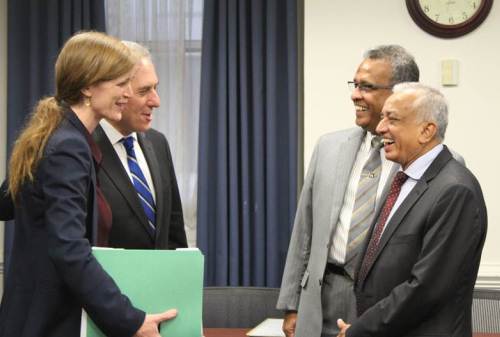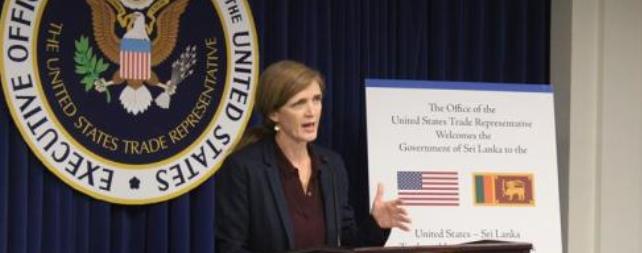Remarks by Ambassador Samantha Power, U.S. Permanent Representative to the United Nations, at a United States-Sri Lanka Trade and Investment Framework Agreement Council Meeting, April 28, 2016.
There were two reasons that I flew down from New York at the crack of dawn this morning to join you. The first is that I fell in love with Sri Lankan food during my visits, and I was told there were going to be string hoppers, curries, and pol sambol here, but I was misled.
Fortunately, the second reason is much more important and it’s the same reason that our nation’s trade representative is dedicating so much of his time to this and why he and his team are spearheading these discussions. And that is because of the importance President Obama, himself, places on the United States’ bilateral relationship with Sri Lanka. More specifically, our commitment – and his commitment – to Sri Lanka’s continued progress, and our determination to support President Sirisena in his efforts to ensure that this progress delivers socio-economic benefits for the people of Sri Lanka.
Of course, the fact that we are all here in an incredibly positive atmosphere reflects just how much has changed in Sri Lanka since January 2015. That was the month where Sri Lankans cast their votes for a new era: one in which their leadership committed to seeking a durable peace, an accountable democracy, a new relationship with the outside world, and expanded opportunities for all.
In the sixteen months since that election, President Sirisena’s administration has made extraordinary progress toward these goals. The difference in the political and the security climate is felt across the island. When I visited in November, the change since my last visit in 2010 was palpable. People told me that it felt as though a repressive climate of fear had been lifted and that they could breathe again. Activists felt safe to work openly and, of course, to criticize the government with new fervor. Journalists reported freely; political prisoners were being released; land was being returned to the people; and the internally displaced were beginning to go home in new numbers. As part of its determination to deal with the abuses of the past, moreover, the government had committed to justice and reconciliation processes to try to serve all Sri Lankans. I’ve traveled to a lot of places going through transition and change, many of which have gone through conflict – of course every conflict is different from every other conflict – but conflict that also has left deep scars in a nation, as it has Sri Lanka, and I can say I have never seen a country take such swift strides in so little time. And I think it’s extremely important that when a country takes such steps that the United States be there with you and have your back because it’s certainly not easy.
 You also don’t have to even go all the way to Sri Lanka to know how much has changed. I see it every day in New York. After becoming a sad example of creeping authoritarianism very recently, Sri Lanka has, since January 2015, emerged as a global champion of human rights and democratic accountability.
You also don’t have to even go all the way to Sri Lanka to know how much has changed. I see it every day in New York. After becoming a sad example of creeping authoritarianism very recently, Sri Lanka has, since January 2015, emerged as a global champion of human rights and democratic accountability.
In an era when you just open a newspaper and see yet another world leader trying to change their constitution, expand the powers of whatever office they hold, here you have a situation where President Sirisena’s government has passed an amendment to Sri Lanka’s constitution that reintroduced a two-term limit and reduced the power of his own office. To cite another example, Sri Lanka demonstrated last year its emerging leadership in UN peacekeeping, when President Sirisena announced new substantial military and police commitments – including infantry battalions, special forces, and combat logistic units – in a manner that’s going to benefit regional and global peace and security. This was one of the most impressive and significant pledges made at President Obama’s peacekeeping summit. And finally, Sri Lanka is in the midst of joining the Open Government Partnership, which will help it put in place some of the best practices that have been learned around the world in improving transparency, enhancing democratic accountability, and, critically, fighting corruption.
Now, the wounds from the war run deep, of course, in people’s hearts and souls, the political headwinds that one faces, particularly when one is trying to execute as ambitious an agenda as President Sirisena and his government are doing – those headwinds can be very intense – and there’s a ton of work left to be done, including on such goals as transitional justice, promoting lasting reconciliation, improving the quality of governance, clearing out the red tape, all of the issues that you all are trying to work through. And we are very clear-eyed about the challenges ahead, including the one that brings us together today, which is ensuring that the progress extends to Sri Lanka’s economy, and that it leads to improvements in daily lives. As the minister indicated, Sri Lankans are impatient and if we were in their shoes, we would be impatient too. They want to see a democracy dividend and they want to see it quickly. Now, unfortunately, achieving the socio-economic growth that they want right now is probably going to take a little more time than any of us would like, given the legacy of war, the corruption, and the economic mismanagement of recent years, and some of the global economic dynamics that the minister has described. But the Joint Action Plan being adopted today will help make this happen. It will expand trade, encourage foreign investment, and spur growth – and in so doing, it will help boost employment, income, and living standards. And I think the minister has opened up a whole set of other ideas that I know will be discussed over the course of the day and beyond.
I’m struck also that this comprehensive effort dedicated itself also to empowering women economically, which is strategically very important given the long-established economic benefits that countries derive when they tap the productive capacity of all of their citizens. Sri Lanka has already achieved impressively high rates of female education, with women making up 60 percent of university undergrads. I had the privilege of meeting with a group of women entrepreneurs and they were extraordinary; you could just see the potential that is longing to be unlocked as Sri Lanka reintegrates itself in a whole series of ways. The principles laid out in the Joint Action Plan and the initiatives they facilitate will help further break down the barriers for women entrepreneurs, and again, that’s to the benefit of all Sri Lankans.
The United States will seek to leverage our assistance this year to further support broad-based economic growth. Sri Lanka’s acceptance as a threshold member of the Millennium Challenge Corporation will provide another means through which we can provide financial and development assistance. But I know from my visit and from talking to Sri Lankans that this kind of forum is where most believe the action is, because this is where the kinds of agreements and changes that can be secured can pay lasting dividends and get into the fiber and the DNA of Sri Lankan society.
Let me conclude. On my final day in Colombo last November, I hosted a town hall for local students and looking around the room, they reflected the incredible diversity of the Sri Lankan population – they hailed from every corner of the country, and represented all of the mélange of the faith communities and ethnic communities that comprise Sri Lanka. I got a grilling – they asked me tough questions, probing questions on accountability, human rights, reconciliation, the role of women, when would there be an economic dividend on Sri Lanka’s democratic turn. They were inspiring, I think both because of their thoughtfulness, because they reflected all of the potential that exists within Sri Lanka given the education base, and they were just so fiercely determined to have a hand in improving their country. So it was clear that those young people want what everyone in this room wants for Sri Lanka: a country that is peaceful and democratic, where every citizen has a fair chance to build a better life. And I think it’s very important to note that in just sixteen short months, President Siresena and his administration have given those young people new reason to believe that this goal is attainable. And today, through your work, you can help move Sri Lanka even closer to achieving it.
So I thank you and I wish you good luck in your discussions ahead.
US Embassy Colombo
